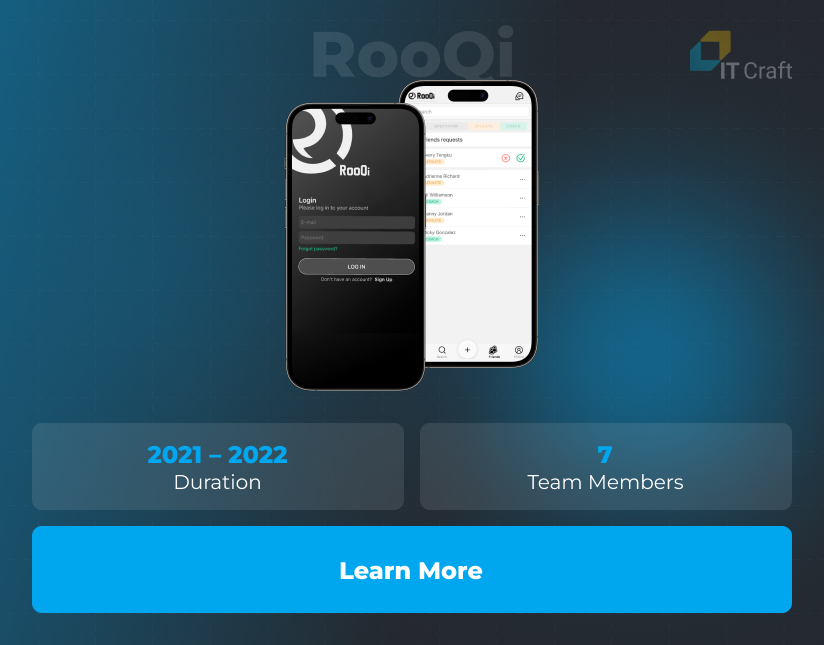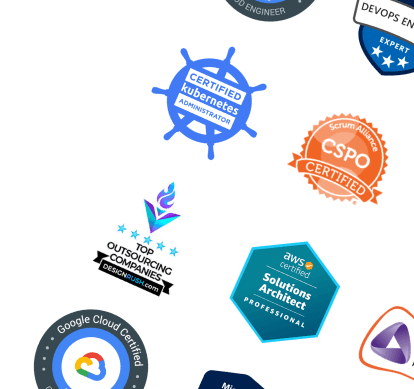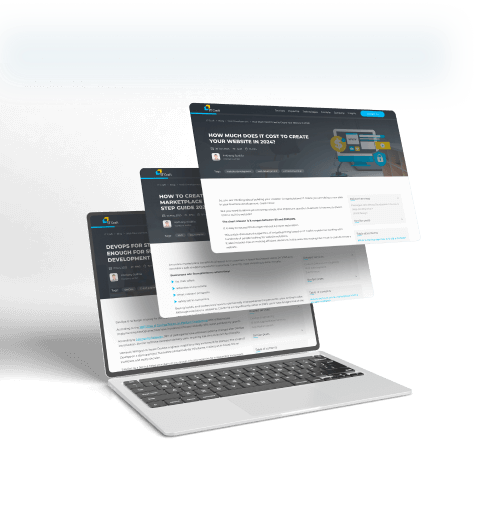Deciding on the best mobile programming language for your requirements is critical for efficient and cost-effective mobile app development.
Cross-platform and hybrid technologies such as Ionic, React Native, and Flutter can deliver 234% ROI by letting developers share the same code base across all platforms.

However, it is possible that development using native mobile languages will be quick and profitable for YOUR project, while a non-native app will turn into a waste of resources.
Below, we discuss the best languages for app development and what makes them the top choice for specific types of projects.
1
What Types of Mobile Apps Are There?
There are three types of mobile apps, each relying on specific best languages for mobile app development:
- Native mobile apps
- Cross-platform mobile apps (including hybrid apps)
- Progressive web apps (PWAs)
When launched, these apps may look the same to end users. However, they differ in their performance and how the source code interacts with mobile hardware on target platforms.
Also, the development team that will work on a project can specialize in one or another technology but not in all of them because the skills and expertise required to develop each type of mobile app are also different.
Ultimately, technologies can be compatible but they are not interchangeable. Transferring a project from one technology to another can be cumbersome, requiring much rework.

Let’s look at the differences:
Native Apps
The development team builds a native app using platform-specific programming languages: Kotlin or Java for Android and Swift or Objective-C for iOS. The team prepares and maintains a separate codebase for each platform.
To develop native apps, a business needs to hire a team that includes separate iOS and Android developer roles. So why are native apps still popular despite all the complexity and expense?
Native apps are cost-effective for long-term, complex projects. They can also allow businesses to win a loyal user base through uncompromised performance, consistent interfaces, and less problematic updates compared to non-native technologies.
Additionally, some features require native implementation because they either will not work stably or will not work at all with a hybrid or PWA approach.
Pros:
- Optimum performance
- Great access to device hardware
- Best possible stability
- Prioritized by Google/Apple
- High upfront costs
- Long development time
- Bigger team with developers specializing in a specific platform
- Need to maintain two separate codebases
Cross-Platform Apps (Including Hybrid)
Cross-platform frameworks and technologies let create a universal codebase for different mobile platforms. Where possible, they provide a native-like look and feel and rely on native components and APIs.
Hybrid apps are a subset of cross-platform apps that combine elements of web and native apps within a united approach. They use different plugins to access native features and APIs.
The cross-platform approach lets businesses decrease initial investment and leverage existing technology. It also ensures that companies can quickly find engineers.
Pros:
- Decreased development time due to shared codebase
- Wide availability of skilled developers
- Access to native features and great performance
- Suited for niche development
- Codebase still requires adaptation
- Expertise in using native APIs is crucial
- Maintenance can be difficult
- May not be as cost-effective as desired
Progressive Web Apps
PWAs use mobile browser capabilities to deliver app-like experiences to end users. They are based on classic web technologies and aim to provide great interactivity and responsiveness on various screen sizes.
Users can reach PWAs from any platform via a browser, including from a desktop. And because a PWA is a web page, users can find PWAs in search results, which is great for business promotion.
You can publish a PWA on Google Play and the Microsoft Store but not on Apple’s App Store. On the bright side, some web-based features can be updated quickly without requiring a lengthy app review process on the store side.
Pros:
- Short delivery time
- Visibility for SEO
- Access from all devices
- Simplified updates without going through app store reviews
- Limited access to native features
- Problems with app publishing
- Performance issues
- Difficult to optimize device energy consumption
What is the best language for mobile app development on your project?
Share your requirements and limits with our team and we will help you determine the risks and benefits of each approach.
Contact Us
2
Best Programming Languages for App Development
What is the best programming language for mobile app development?
Here is IT Craft’s top list:

Each type of mobile app calls for different programming languages. Native app developers must rely on languages and ecosystems prescribed by operating system vendors.
Cross-platform and web app developers have more flexibility than native app developers. They can use any toolset in which they have expertise.
Native iOS Programming Languages
Native iOS app development tends to be more expensive than Android development because iOS developers must stick to the costly Apple ecosystem.
However, it pays off because iOS users spend significantly more on apps than Android device owners do.

Source: Statista
It’s little surprise that companies that rely on mobile-first products opt to release them on Apple devices first.
Swift
Basically, Swift is the best language for iOS app development in 2024. Swift is an excellent multipurpose language for building a secure, readable, and fast codebase.
Developers can easily adapt Swift source code to multiple Apple operating systems, including iOS, macOS, tvOS, visionOS, and watch OS. Also, Swift has comprehensive, easy-to-read documentation and a supportive community.
Objective-C
Now largely replaced by Swift, Objective-C is still present in many ongoing iOS projects. Developers use it to update and maintain complex legacy projects where transitioning to Swift is too expensive or impractical.
Also, Objective-C is best for integrating C-based services and provides access to a wide ecosystem of libraries, frameworks, and solutions. Wide interoperability allows developers to easily mix both Swift and Objective-C within one project.
Native Programming Languages for Android
Although Android holds 38.81% market share in the US versus iPhone’s 60.77%, businesses should not ignore it.
Certain niches, such as meditation and fitness apps, show stable revenue on the Android platform. Also, Android’s open-source nature lets businesses launch products for fans of innovative and sustainable products such as Fairphone.
Like iOS, Android has two native programming languages: Kotlin and Java. Google also provides convenient instruments for cost-effective project development.
Kotlin
Google endorses Kotlin as the best coding language for app development on the Android platform . It has more concise syntax and improved programming features, yet it performs the same as Java.
While both languages offer a similar development experience, Kotlin has features that improve the development workflow. Also, Kotlin Multiplatform, a Kotlin-based cross-platform SDK, has been designed to make source code work on iOS and desktop, and will help Kotlin compete against cross-platform frameworks.
Java
Java remains popular on long-running Android projects due to its maturity and large ecosystem of frameworks, libraries, and instruments, though it is gradually losing the competition to Kotlin.
Another important point why Java still remains popular is that developers can easily call Java code in a Kotlin project and vice versa, which enables them to add new features to old projects and integrate existing libraries into new ones.
Best Mobile App Development Languages for Cross-Platform Apps
According to Ionic research, cross-platform app development makes it possible to launch two to three times faster than with a native development approach.
The choice of the best programming language for app development depends on the tech stack a development team specializes in as well as which language the existing source code is written in.
Here are the most popular options:
JavaScript (React Native)
From IT Craft’s observations, React Native development enables teams to save up to 30% on total development costs.
A React development team needs minimal time to convert an existing app to a mobile platform. It can easily manipulate UI components and process data using familiar JavaScript.
Dart (Flutter)
A great tool for cross-platform apps, Flutter has a rendering engine under its hood that gives developers precise control over UI elements so they can build an excellent look and feel on all platforms at once.
Flutter compiles Dart code into platform-native code, providing smooth performance. Still, it requires time to learn (so choose an experienced team!). Also, due to Flutter’s relative novelty, there are fewer Flutter libraries and packages compared to React.
C# (Xamarin/.NET MAUI)
C# is the best programming language when the existing solution is based on Microsoft technologies.
The Xamarin framework and .NET MAUI, which replaces Xamarin in Microsoft’s ecosystem, enable developers to write well-structured code with simple syntax. Using C# lets developers eliminate compatibility issues, even on wearables.
Still, features may work differently on Android and iOS, requiring adjustments to the codebase. Also, delays can emerge when OS vendors introduce system updates because Microsoft developers need to integrate them into new framework releases.
Python (Kivy, BeeWare)
Kivy and BeeWare, Python-based frameworks, allow developers to deploy source code across various platforms. Both simple and intuitive technologies help deliver apps fast, ensuring great graphics performance and flexibility.
The drawbacks of Kivy and BeeWare include few resources and a small community. Kivy may be too simple for large projects, while BeeWare has a steep learning curve.
JavaScript (Ionic)
As a hybrid framework, Ionic lets developers reuse standard web technologies to access native APIs on mobile app projects.
Developers leverage Apache Cordova and its plugins to access mobile device hardware, saving time on project development, setup, and deployment.
Still, access to some hardware features can be difficult, requiring bridges with native code. Also, performance issues can occur on complex projects.
Progressive Web Apps
Progressive Web Apps (PWAs) enable a head start from web to mobile, requiring minimum knowledge in mobile app development languages from the project team. Instead, the team can use web programming languages and frameworks in which they are already proficient.
CSS/HTML/JavaScript
PWAs are based on classic web technologies: HTML, CSS, and JavaScript. To convert a website into an app, software developers add three key components:
- A service worker
- A web manifest
- Secure HTTPS
PWAs significantly lower the entry barrier, allowing every web developer to launch a mobile app fast and efficiently using tools they know well.
TypeScript/JavaScript (Angular, React, Vue)
Single-page application (SPA) frameworks such as Angular, React, and Vue are used for highly responsive web apps that look and work great on mobile devices. Developers use JavaScript or TypeScript to complete SPAs.
With some effort, developers can turn an SPA into a PWA, ensuring improved offline mode and notifications. Also, a React-based SPA can be turned into a mobile app with the help of React Native.
3
Key Factors when Choosing a Mobile App Development Language
PWAs are the cheapest and fastest option, native apps are the most expensive option on the list, and cross-platform apps fall in the middle.
However, choosing a PWA does not guarantee the shortest path to YOUR successful launch.
Examine the following aspects when deciding on the best programming language for your project:
Vision and requirements
- Prioritize native development when the app depends on performance (CPU and memory usage, initial load speed). Also, native is the top choice when you need swift access to device sensors/hardware.
- When performance has medium to low priority and the app requires only occasional access to a native platform’s capabilities, both cross-platform and PWA development can be an option.
Budget and timeline considerations
- A PWA lets you test market interest with a simple mobile app for the least investment.
- Cross-platform development tools let you save a considerable amount of money (up to 50%) and launch simultaneously everywhere.
- Still, it makes sense to focus on one native platform when you have complex requirements but a limited budget and timeline.
Ecosystem
- Often, the tech choice depends on the availability of APIs and third-party solutions that decrease development time. Check which language’s ecosystem provides the best capabilities in your industry.
- Select a language with tools and documentation (SDKs, IDEs, utilities, guides on best practices) that support a streamlined development workflow.
- Think of long-term support for each technology, checking whether it has a vibrant community or enterprises that use and develop it actively.
- When you have source code available, it makes sense to repurpose it by going for cross-platform/hybrid development.
Licensing
- The cost of licenses and subscriptions for the selected ecosystem is important. Carefully estimate current and future expenses of integrated third-party solutions. Consider ease of migration in case terms and conditions stop being favorable.
Team Skills
- When two programming languages provide similar benefits and tradeoffs, the team’s expertise becomes the deciding factor in order to maintain high productivity.
Get an expert consultation now
IT Craft engineers work with all types of mobile technologies. We can help you choose yours.
Contact Us
Updates and expansion
- Consider your app in the long term. The team needs a language that allows for easy maintenance of the codebase.
- Ensure that the selected language’s capabilities enable your team to add required features in the future. Prefer languages that allow for building a flexible and scalable architecture.
Last but not least, encourage the team to learn the basics of mobile platforms. Knowledge of native platforms and languages is required to understand and solve hidden integration issues. For deeper insights into where the industry is headed, explore the latest mobile app development trends.
4
IT Craft’s Expertise
If you are looking for five-star mobile app development services, you are in the right place.
You can hire one or several developers or a dedicated team that will provide you with all the expertise needed to:
- deliver an app from scratch (native, cross-platform, or hybrid)
- repurpose existing source code for mobile platforms
- add new functionality
- improve app quality
- maintain your app’s infrastructure
- update project technologies
RooQi
RooQi is an iOS app that connects young talents and coaches. Athletes can showcase their skills, while coaches can browse and discover athletes, then get in touch with them immediately via the app.
The client needed
The client had a vision for their iOS app and wanted to build it within budget limits.
How we helped
IT Craft developers studied the client’s requirements, carefully estimated all project details, and offered an implementation path based on a fixed-price approach. The team delivered the iOS app on budget, ensuring support for future extensions.

!
Summary
Choosing the best programming language for specific project needs and goals is critical for your project’s ultimate success. With our mobile app development solutions, you can make informed decisions from the start.
When choosing the best language for app development, consider the following factors:
- complexity of requirements
- team’s expertise
- ecosystem around the language (frameworks, libraries, third-party solutions)
- costs of licenses
- availability of source code
- long-term maintainability and scalability











